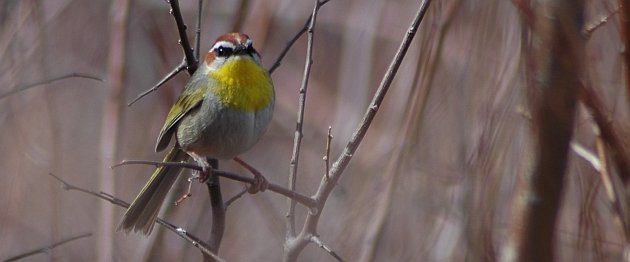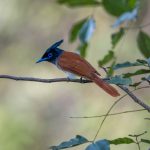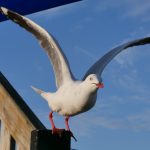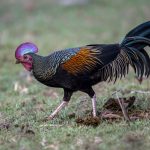
This Rufous-capped Warbler was seen and photographed without the aid of playback. It was a very pleasant experience. Florida Canyon, AZ.
Not long ago, my dear colleague Seagull Steve (Global Birder Ranking System’s U.S. #7) had a blog post that got me thinking. Here are a couple excerpts.
[The Rufous-capped Warbler] quickly skulked off, but I was happy. A few minutes later my avian company was replaced by a haggard-looking dude with a massive camera setup, his arms covered in cuts. He was sweating profusely, had a thick southern accent and kept calling me “Slick”, which I’d never heard before outside of movies. He had obviously been trying really hard to see/photograph the Rufous-capped Warbler, and despite being there for hours had failed up to that point in the morning.
“It used to come into tapes,” he said, with obvious disappointment in his voice.
“Well, yeah. When everyone is using tapes on a bird, it will tape the bird out”, I observantly pointed out to him.
I told him where I last had the bird and he stumbled over to the spot, looking forlornly at the slope that the warbler had previously occupied a few minutes earlier. Eventually he came back to me and said, “Hey Slick. I drove 3,000 miles for this, I’m going to play a tape.” I responded unenthusiastically and got the [expletive deleted] out of there.
That’s not all Seagull had to endure that day.
…the [Buff-collared Nightjar] began calling in earnest, and I could tell the bird had moved off the hill and was coming closer and closer. I drooled horribly, knowing that I had a chance of actually getting eyes on the thing. But as the suspense mounted, I heard some other birders pull up on the road behind me. They were not good birders. The nightjar was singing loudly, almost incessantly, and from the snippets of conversation I could hear it was obvious that the new birders had no clue they were listening to it (New York birder eventually pointed this out to them). New York birder later told me that they then asked if they could do some playback, New York birder said “no”, and they responded by saying they had driven too far and they were going to do it anyway. Sound familiar, Slick?
And so they began blasting nightjar song while the bird was still singing, and of course it immediately shut up. Heads were about to roll…
As you know, the common theme here is playback. This isn’t anything new, as the use of playback has been debated over and over again by birders everywhere. But today I am approaching it from a different angle…I will speak not of whether or not it causes stress or disturbance to birds (the usual point of contention), but rather how it causes stress and disturbance to birders.
Personally, I do not use playback. It’s not that I’m completely against it, it’s just that the whole aesthetic of it bothers me, for reasons that are both tangible and also difficult to describe. I know that a lot of birders share this sentiment. For those who do not understand this, I’m not sure you could actually pick up what I’m throwing down here. Birding is often more than getting a tick, and not all birders are conscious of this. Too often I’ve walked up to a flock of birds only to find an oblivious birder blasting pygmy-owl calls at them. It makes me want to run away, every time. Not because I think the birds will be traumatized by the experience, but because I just don’t want that experience to be my experience. Doing that on your own is one thing, but using playback when other birders around is something else.
And then there are cases like Seagull Steve mentions, where birders use playback specifically on a target bird. This can disrupt a bird’s behavior, causing birders to dip on something they may have otherwise had a chance of seeing. Seagull Steve easily could have had his Buff-collared Nightjar meeting cut short, with the bird going silent or flying the opposite direction from where playback was being used. Ironically, he eventually saw it because as it was making it’s escape, it flew right by him. He was the only birder to lay eyes on it that night. It should be stated that the two locations mentioned above, where the warbler and nightjar were, were the only places in the whole country these species could reliably be found. Do those birds really need to be bombarbed by playback by countless visiting birders? Do birders want to risk mistaking someone using playback for the real deal?
That’s right. It happens. Birders can, and do, mistake someone using playback for a real bird’s real vocalizations. This has happened to me too many times to count. This is incredibly frustrating, at best. When I heard a Least Flycatcher in San Francisco the other day (a quality bird here on the west coast), I had to find the closest birder just to make sure it wasn’t him using his phone. This should not be necessary. It is sad that we birders who have fought tooth and nail over the years to learn bird vocalizations now have to contend with this problem on a frequent basis. Who knows how much confusion and how many false ticks this phenomenon had lead to already?
So there it is birders…if you don’t want to be conscious about your playback use for the birds themselves, maybe you can do it for other birders. I know it’s tempting to use it (particularly for tour guides and field trip leaders), but many of us consider it poor form. So please, mind your birding manners…I will be very appreciative, and don’t forget; the Global Birder Ranking System is watching.













While it sorta gives me the warm and fuzzies to think birders might change their behavior out of etiquette considerations toward other birders that might just be the biggest pipe dream I’ve contemplated in a long time. Those who engage in playback especially at major stake out locations popular with other birders are of a certain genetic make-up that is beyond alteration.
Dear F. J. –
Thank you for taking on this subject.
There are more touchy subjects to come, but this one is certainly one of the most abusive areas of birding. Listers have little concern for their etiquette and is one of the major reasons, I have given up most of that activity of which I was once a champion. I am also at the edge of resigning from the ABA and I have been a life member for very close to 40 years.
The only hope for real change which we know is necessary is continued peer pressure. Congrats on taking a public stand!
The Coyotes are bowing very close to the deck!
Choteau, Montana
Howling… not bowing… greatest typist meeting the great ornithologist …
I must hold up my hands to an incident that occurred a couple of years ago. My friend and I were birding with our young sons and were informed that a Wood Warbler was singing on the reserve.
We reminded ourselves and primed our boys to be on the listen out for the warbler, by playing a quick snatch of the song, but please note, we were still in the car, parked in the parking lot.
Moments later the car was surrounded by confused birders trying to locate the bird. Ooops!
Apologies to those birders and to one in particular who had jogged back down the path with scope, camera et al.
Thank you! I was beginning to think I was the only one.
And the problem is only going to get worse now that virtually everyone has complete field guides and playback systems built into their phones.
My personal aesthetic prevents me from carrying into the field anything that requires a battery. But that’s me; I don’t for a moment expect that others will feel that way. But a few short yers ago, when bird call playback systems were bulkier and more expensive, it was a part of all birders code of ethics to be HIGHLY judicious in the use of recordings, lest we disturb the very birds we were seeking to observe in situ.
What about those ethics has changed?
Excellent piece. Playback has always made me extremely uncomfortable and I don’t even know why exactly. On a similar note, I was super psyched to hear some elk bugling last week, only to have it dawn on me that it was probably hunters. Later verified. Bummer.
Using tapes is a crutch. Saying, “I’ve driven a 1,000 miles to see this bird” is an excuse. But the people who use tapes, and who use excuses for using tapes will never realize there is more to birding than ticking off birds on a life list.
Well, I know we all like to SEE our birds, but isn’t this (in addition to dragging chains through swamps) and excellent reason why one may count heard-onlys?
Thanks for the comments everybody. I really expected to hear from someone from the other side of aisle, so to speak, but I suppose it’s a position that is difficult to defend.
i don’t disagree with many of the points raised here about the misuses of birdsong playback but I think there are other benefits that have gone unmentioned. As s publisher of an app with bird song recordings I can tell you that we receive dozens of letters and emails every month from parents who say the apps bird songs awoke the soul of their autistic child and completely altered his or her life. “Now my child spends every day learning to identify birds by song . They want to be outdoors and see the birds they learned about which is a real miracle.” This is a typical email and it brings a get deal of gradification to the people building these products.